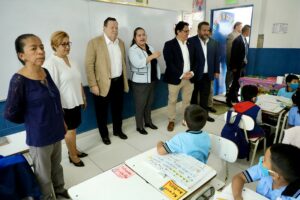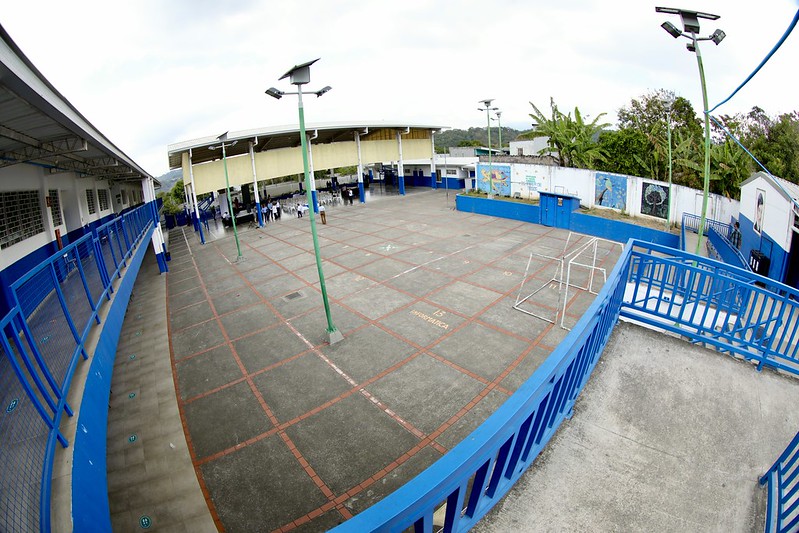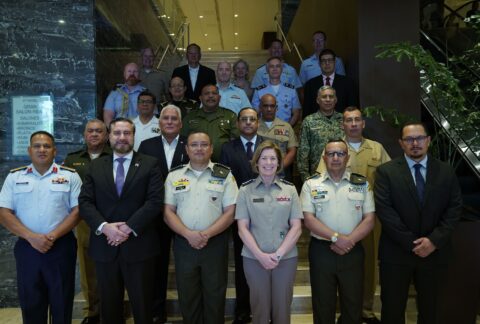The U.S. government and the Salvadoran Ministry of Education, Science, and Technology launched the Educational Innovation Project in a bid to improve the safety and quality of education for children between the 1st and 6th grades in 300 public schools in the departments of Santa Ana, San Salvador, and San Miguel. To implement this initiative for the 2023-2027 period, the U.S. Agency for International Development (USAID) will invest $27.4 million, the U.S. Embassy in El Salvador indicated.
The Pedro Pablo Castillo School Center in the municipality of Nuevo Cuscatlán, La Libertad department, was chosen as the launching site for the initiative. This school, which Hurricane Ida destroyed in 2009, was rebuilt thanks to a $1.5 million investment from USAID, Salvadoran newspaper La Prensa Gráfica reported.
“It’s important to study poor school performance, or negative data from their family or community context, to have the capacity to generate pedagogical and didactic theory, to write and publish findings,” Picardo Joao, researcher and director of the Institute of Science, Technology, and Innovation at the Francisco Gavidia University in El Salvador, told Diálogo on April 28. “Additionally, one must have intuition to identify students on the autism spectrum, with dyslexia, ADHD, and other learning disabilities, among many other capabilities.”
Authorities said that this cooperation will raise the basic competencies of 2,000 teachers with emphasis on reading, mathematics, and psychosocial well-being, to improve the quality of basic education for children and youth, including the marginalized and vulnerable.
“My father was a schoolteacher […], he spent hours after dismissal giving free individual classes […]. He gave them much-needed attention,” said U.S. Ambassador to El Salvador William Duncan, during the launch event on March 1. “I know firsthand the impact a teacher can have on the lives of his or her students because I lived it. I saw how attention, patience, and commitment affected students. I know that many students at my school felt less alone because of the effort my father made.”
Strengthening teachers’ skills and the quality of the education they provide fulfills one of the purposes of the project: to ensure that students stay in school until they finish high school, which is essential for more employment opportunities in the future.

“We recognize that the role of a teacher is incredibly important in the formation of their students. The future that all Salvadorans want for their country begins to be built here,” added Ambassador Duncan. “A prosperous future with economic opportunity needs an educated and skilled workforce. A secure future free of crime and gangs depends on the alternatives offered to young people.”
The Multipurpose Household Survey 2022 (EHPM) conducted for the first time by the Salvadoran Central Reserve Bank indicated that 66,353 children and adolescents between the ages of 5 and 17 engaged in child labor. Four out of 10 children are not attending school, Salvadoran daily El Diario de Hoy reported on April 22.
According to the EHPM, boys were the most likely to engage in child labor and 75.4 percent were minors. Of the 66,353 children who were recorded working, 60.9 percent lived in rural areas of the country.
“The training of our teachers is a key point, non-negotiable. We are going to make every effort so that our teachers become that pedagogical mediator that we need in the classroom […], in that model that our students want and must follow,” Education Minister Mauricio Pineda said. “For that we need to invest, to transform education, to an education that allows us to get our country out of the backwardness we find ourselves in.”
Another integral part of this project is to strengthen the capabilities of higher education institutions to develop research and generate useful knowledge on basic education, focused on improving teacher education and in-service training.
U.S. organization Family Health 360 together with a consortium of Salvadoran organizations, such as Fundación Salvador del Mundo, Fundación Pro-Educación de El Salvador, Contextos, Glasswing International, and Inclusive Development Partners, contributed to the implementation of the Educational Innovation Project.









